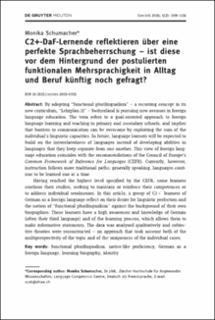Please use this identifier to cite or link to this item:
https://doi.org/10.21256/zhaw-11884Full metadata record
| DC Field | Value | Language |
|---|---|---|
| dc.contributor.author | Schumacher, Monika | - |
| dc.date.accessioned | 2018-10-16T16:49:29Z | - |
| dc.date.available | 2018-10-16T16:49:29Z | - |
| dc.date.issued | 2015-10-01 | - |
| dc.identifier.issn | 2191-611X | de_CH |
| dc.identifier.issn | 2191-6128 | de_CH |
| dc.identifier.uri | https://digitalcollection.zhaw.ch/handle/11475/11884 | - |
| dc.description | Erworben im Rahmen der Schweizer Nationallizenzen (http://www.nationallizenzen.ch) | de_CH |
| dc.description.abstract | By adopting “functional plurilingualism” – a recurring concept in its new curriculum, “Lehrplan 21” – Switzerland is pursuing new avenues in foreign language education. The term refers to a goal-oriented approach to foreign language learning and teaching in primary and secondary schools, and implies that barriers to communication can be overcome by exploiting the sum of the individual’s linguistic capacities. In future, language learners will be expected to build on the interrelatedness of languages instead of developing abilities in languages that they keep separate from one another. This view of foreign language education coincides with the recommendations of the Council of Europe’s Common Framework of Reference for Languages (CEFR). Currently, however, instruction follows more traditional paths; generally speaking, languages continue to be learned one at a time. Having reached the highest level specified by the CEFR, some learners continue their studies, seeking to maintain or reinforce their competences or to address individual weaknesses. In this article, a group of C2+ learners of German as a foreign language reflect on their desire for linguistic perfection and the notion of “functional plurilingualism” against the background of their own biographies. These learners have a high awareness and knowledge of German (often their third language) and of the learning process, which allows them to make informative statements. The data was analysed qualitatively and subjective theories were reconstructed – an approach that took account both of the multiperspectivity of the topic and of the uniqueness of the individual cases. | de_CH |
| dc.language.iso | de | de_CH |
| dc.publisher | De Gruyter | de_CH |
| dc.relation.ispartof | Language Learning in Higher Education | de_CH |
| dc.rights | Licence according to publishing contract | de_CH |
| dc.subject.ddc | 418.0071: Sprachdidaktik | de_CH |
| dc.subject.ddc | 430: Deutsch | de_CH |
| dc.title | C2+-DaF-Lernende reflektieren über eine perfekte Sprachbeherrschung : ist diese vor dem Hintergrund der postulierten funktionalen Mehrsprachigkeit in Alltag und Beruf künftig noch gefragt? | de_CH |
| dc.type | Beitrag in wissenschaftlicher Zeitschrift | de_CH |
| dcterms.type | Text | de_CH |
| zhaw.departement | Angewandte Linguistik | de_CH |
| dc.identifier.doi | 10.1515/cercles-2015-0015 | de_CH |
| dc.identifier.doi | 10.21256/zhaw-11884 | - |
| zhaw.funding.eu | No | de_CH |
| zhaw.issue | 2 | de_CH |
| zhaw.originated.zhaw | Yes | de_CH |
| zhaw.pages.end | 328 | de_CH |
| zhaw.pages.start | 309 | de_CH |
| zhaw.publication.status | publishedVersion | de_CH |
| zhaw.volume | 5 | de_CH |
| zhaw.publication.review | Peer review (Publikation) | de_CH |
| Appears in collections: | Publikationen Angewandte Linguistik | |
Files in This Item:
| File | Description | Size | Format | |
|---|---|---|---|---|
| 2015_Schumacher_C2-DAF-Lernende-reflektieren-ueber-perfekte-Sprachbeherrschung_CerleS.pdf | 1.01 MB | Adobe PDF |  View/Open |
Show simple item record
Schumacher, M. (2015). C2+-DaF-Lernende reflektieren über eine perfekte Sprachbeherrschung : ist diese vor dem Hintergrund der postulierten funktionalen Mehrsprachigkeit in Alltag und Beruf künftig noch gefragt? Language Learning in Higher Education, 5(2), 309–328. https://doi.org/10.1515/cercles-2015-0015
Schumacher, M. (2015) ‘C2+-DaF-Lernende reflektieren über eine perfekte Sprachbeherrschung : ist diese vor dem Hintergrund der postulierten funktionalen Mehrsprachigkeit in Alltag und Beruf künftig noch gefragt?’, Language Learning in Higher Education, 5(2), pp. 309–328. Available at: https://doi.org/10.1515/cercles-2015-0015.
M. Schumacher, “C2+-DaF-Lernende reflektieren über eine perfekte Sprachbeherrschung : ist diese vor dem Hintergrund der postulierten funktionalen Mehrsprachigkeit in Alltag und Beruf künftig noch gefragt?,” Language Learning in Higher Education, vol. 5, no. 2, pp. 309–328, Oct. 2015, doi: 10.1515/cercles-2015-0015.
SCHUMACHER, Monika, 2015. C2+-DaF-Lernende reflektieren über eine perfekte Sprachbeherrschung : ist diese vor dem Hintergrund der postulierten funktionalen Mehrsprachigkeit in Alltag und Beruf künftig noch gefragt? Language Learning in Higher Education. 1 Oktober 2015. Bd. 5, Nr. 2, S. 309–328. DOI 10.1515/cercles-2015-0015
Schumacher, Monika. 2015. “C2+-DaF-Lernende reflektieren über eine perfekte Sprachbeherrschung : ist diese vor dem Hintergrund der postulierten funktionalen Mehrsprachigkeit in Alltag und Beruf künftig noch gefragt?” Language Learning in Higher Education 5 (2): 309–28. https://doi.org/10.1515/cercles-2015-0015.
Schumacher, Monika. “C2+-DaF-Lernende reflektieren über eine perfekte Sprachbeherrschung : ist diese vor dem Hintergrund der postulierten funktionalen Mehrsprachigkeit in Alltag und Beruf künftig noch gefragt?” Language Learning in Higher Education, vol. 5, no. 2, Oct. 2015, pp. 309–28, https://doi.org/10.1515/cercles-2015-0015.
Items in DSpace are protected by copyright, with all rights reserved, unless otherwise indicated.